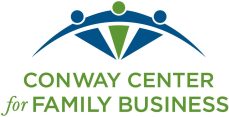By Conway Center Service Provider Kelley King of SG Financial Services, LLC
You have lived and died with the family business. Well, the “died” part may be an exaggeration. Nonetheless, you have poured your life into the business and nurtured it to be what it is today. The questions are: What do you want it to be tomorrow? Not just tomorrow, but after you are gone. Do you want the business to continue? Who will own it? Who will run it? Who will benefit from its value? These questions are just a part of the Business Succession Process and should be addressed in concert with other issues.
While life insurance is not the solution to every problem, it can be an extremely effective tool in a business succession plan. Structured properly, it can provide income tax dollars which can be used in a variety of ways. It also can supply tremendous leverage. For a “few dollars” of premium, an insured can obtain thousands of dollars of life insurance coverage. In this situation, no other investment provides a “payoff” like life insurance. Here are some of the common ways in which life insurance can be integrated with many of the tools, techniques, and strategies commonly used in business succession planning:
Funding a Buy-Sell Agreement
Having a buy-sell agreement is essential. Having funds in the hands of the buyer when needed is critical as well. If funds will be needed to fund a buy-out at death, the alternatives to life insurance include:
• Establishing a sinking fund ahead of time
• Taking capital out of the business
• Making installment payments.
Note that all three of these alternatives require expensive “after-tax” dollars. The life insurance option can guarantee complete financing of the purchase from the beginning.
Estate Equalization
In many families, not all of the children will be interested in or suited to take ownership of the business. If the business goes to the children who are active in the business, what about the others? Is that “Fair”? A business owner can use life insurance to provide for those children who are not involved in the business
Estate Liquidity
For many family business owners, their business is their largest asset. Life insurance can provide the cash needed to pay estate taxes. This can be helpful since the business interests cannot readily be liquidated. Also, if funds are not needed until the death of the second spouse, then less costly Survivorship Life should be considered.
Key Person
Most family businesses have family and or non-family employees that are important to its continued success. To protect against the financial loss due to the death of a key employee, the company can purchase key person life insurance. Key person insurance protects the business and will compensate for that loss and help the business rebuild.
Compensation and Incentive Plans
As owners transition ownership and management of a business, attracting and retaining key employees is essential. This often involves developing compensation plans that will incentivize employees and increase the probability of them staying with the business. Life insurance is a popular vehicle for informally funding these plans because it offers tax-deferred cash value growth and tax-free death benefits.
Closing
It is beyond the scope of this article to delve into all of the advantages, disadvantages, and specific aspects of structuring, obtaining, funding and managing life insurance. Family business leaders should consult qualified legal, accounting, and life insurance professionals who are working together. Life insurance is not the “end-all” of business succession planning, but it can be an extremely valuable part of an overall plan.
The author, Kelley A. King, is VP at SG Financial Services, LLC, a wealth management and insurance services firm headquartered in Worthington, Ohio. For more information and to contact the firm, please call 614.261.0600 Ext 119 or visit www.schiffmangrow.com.

